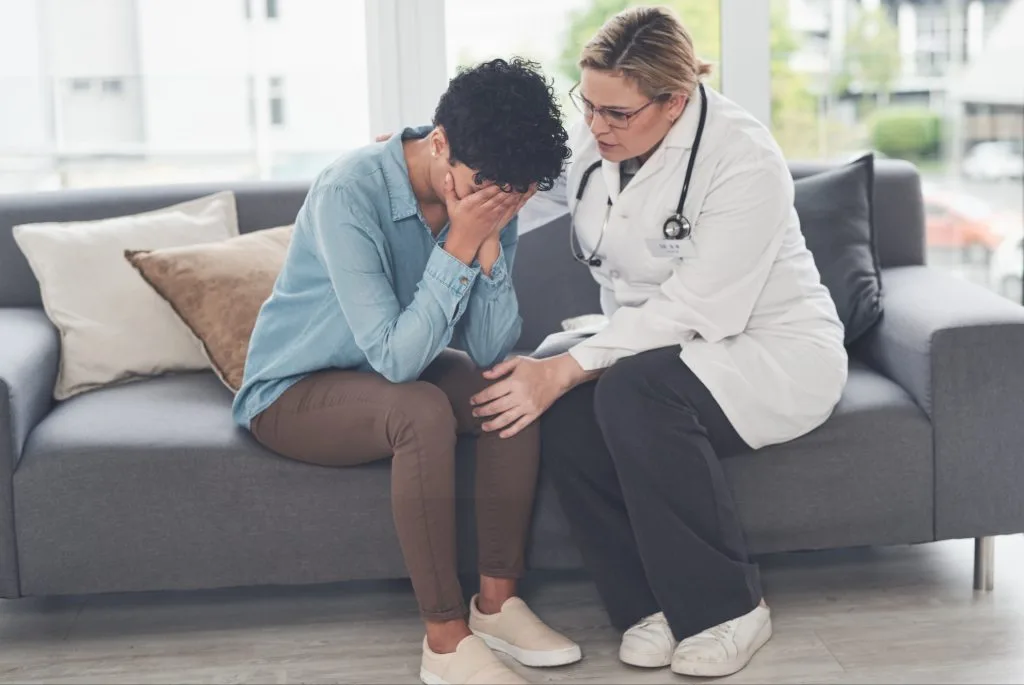A car accident can be a traumatic experience, and the emotional impact often lingers long after the physical injuries have healed. Many people struggle with anxiety following a car accident, experiencing persistent worry, fear, or even panic when driving or thinking about the event. Anxiety is the body’s natural response to stress, but when it interferes with daily life, it can be challenging to manage alone. At Affordable Chiropractic Killeen, we understand how deeply accidents can affect both the body and mind. In this blog, we’ll explore the signs of post-accident anxiety and practical steps you can take to regain a sense of control and well-being.
Why Do Car Accidents Trigger Anxiety?
Anxiety often develops after an accident due to a combination of physical trauma, emotional distress, and the brain’s heightened awareness of danger. The body’s fight-or-flight response, meant to help you react in emergencies, may stay active long after the accident. This can lead to symptoms like racing thoughts, difficulty concentrating, sleep disturbances, and even panic attacks when faced with reminders of the crash.
For some, the fear of driving or being a passenger becomes overwhelming, while others may struggle with generalized anxiety that affects daily life. Understanding why anxiety develops is the first step in regaining a sense of control and working toward emotional and physical well-being.
Recognizing Anxiety Symptoms After a Car Accident
Experiencing anxiety after a car accident is more common than many realize, but it doesn’t always look the same for everyone. Some people notice immediate changes in their emotions and behavior, while others gradually develop symptoms. Understanding the signs of anxiety can help you recognize when emotional distress is affecting your daily life.
Here are some common symptoms to look out for:
- Persistent Worry or Fear: You may feel constantly on edge, worrying about driving, being in a car, or even everyday situations that remind you of the accident.
- Avoidance Behavior: Some people avoid driving or being a passenger because they fear another accident. This can limit independence and disrupt daily routines.
- Flashbacks or Intrusive Thoughts: Vivid memories of the accident may replay in your mind, making it difficult to focus or feel at ease.
- Physical Symptoms: Anxiety doesn’t just affect the mind; it can cause headaches, muscle tension, racing heart, dizziness, or shortness of breath, especially in stressful situations.
- Difficulty Sleeping: Trouble falling asleep, staying asleep, or experiencing nightmares about the accident are common signs of post-accident anxiety.
- Irritability or Mood Changes: Feeling more irritable, overwhelmed, or easily frustrated can indicate underlying emotional distress.
- Panic Attacks: Sudden episodes of intense fear, rapid heartbeat, sweating, and a feeling of losing control can occur when thinking about the accident or encountering triggers.
Anxiety can affect both mental and physical health, making it essential to address these symptoms early.
Types of Anxiety Following a Car Accident
Anxiety after a car accident can show up in different ways, and no two people experience it the same. Some feelings might fade with time, while others stick around and make daily life harder to manage.
Acute Stress Disorder (ASD)
ASD happens in the weeks right after an accident and can last up to a month. It’s the body’s immediate reaction to trauma, and while some symptoms might ease on their own, others may need extra support to manage. Signs of ASD include:
- Hypervigilance: Feeling constantly on edge, always scanning for potential danger.
- Emotional Numbness: A sense of detachment, like you’re disconnected from your emotions or surroundings.
- Avoidance: Steering clear of anything that reminds you of the accident, like driving or talking about it.
- Intrusive Thoughts: Unwanted flashbacks, memories, or nightmares that make it hard to move forward.
If these symptoms don’t improve, they could develop into more long-term anxiety disorders, making early recognition and support important.
Generalized Anxiety Disorder (GAD)
For some, anxiety after an accident isn’t just about driving or being in a car—it seeps into other parts of life, creating ongoing stress and worry that doesn’t go away. Signs of GAD include:
- Persistent Tension: A constant feeling of unease, even when nothing specific is wrong.
- Sleep Disturbances: Struggling to fall or stay asleep because your mind won’t quiet down.
- Irritability: Feeling on edge, frustrated, or quick to anger over small things.
- Restlessness: Difficulty relaxing or feeling calm, even in familiar environments.
Phobias
After a car accident, some people develop specific fears related to the experience, such as:
- Vehophobia: An intense fear of driving or even riding in a car.
- Agoraphobia: Fear of leaving home or being in situations where escape might be intricate, making travel impossible.
These fears can be profoundly limiting, but they don’t have to control your life. With the proper support, it’s possible to regain confidence and independence.
Post-Traumatic Stress Disorder (PTSD)
PTSD is a more severe and long-lasting response to trauma, and it can develop weeks, months, or even years after an accident. It goes beyond general anxiety and can disrupt daily life in significant ways. Symptoms include:
- Re-experiencing: Flashbacks or nightmares that make you feel like you’re reliving the accident.
- Avoidance: Staying away from people, places, or conversations that bring back traumatic memories.
- Negative Mood Changes: Lingering feelings of fear, guilt, shame, or sadness that don’t disappear.
- Hyperarousal: Being easily startled, feeling tense, or having trouble sleeping due to heightened anxiety.
Steps to Manage Anxiety Following a Car Accident
Healing from anxiety takes time, and it’s normal to experience ups and downs along the way. The good news is that there are steps you can take to ease anxiety and regain a sense of control. While everyone’s recovery journey looks different, incorporating these strategies can help you move forward.
1. Lean on Your Support System
You don’t have to go through this alone. Opening up to people you trust can provide comfort and reassurance. Consider:
- Talking to Friends and Family: Sharing your thoughts with loved ones can help relieve emotional weight.
- Joining a Support Group: Connecting with others who have experienced similar trauma can help you feel understood and less isolated.
Knowing you have people to turn to can make a big difference.
2. Incorporate Relaxation Techniques into Your Daily Routine
Calming your mind and body can help ease anxiety over time. Try incorporating these simple relaxation methods into your routine:
- Deep Breathing Exercises: Breathe in slowly through your nose, feeling your stomach expand, then exhale gently through your mouth. Repeat for a few minutes to reduce tension.
- Progressive Muscle Relaxation: Tense and release different muscle groups, starting from your toes and working up to your head. This can help release built-up stress.
- Guided Imagery: Picture yourself in a peaceful setting, like a quiet beach or a calming forest, to help shift your focus away from anxious thoughts.
Even just a few minutes of relaxation each day can have a noticeable impact on how you feel.
3. Engage in Physical Activity
Movement is a natural way to relieve anxiety. Exercise releases endorphins, which boost mood and promote better sleep. Some simple ways to get moving include:
- Walking: A short walk outdoors can help clear your mind and lift your spirits.
- Yoga: Gentle stretches and deep breathing help reduce tension and improve flexibility.
- Swimming: The soothing, rhythmic movements of swimming can be meditative and calming.
Even small amounts of movement can help ease anxiety and improve overall well-being.
READ MORE: How Physical Therapy Can Help Car Accident Recovery
4. Gradually Rebuild Your Confidence Behind the Wheel
With time and patience, you can regain your sense of control behind the wheel. Feeling nervous at first is completely normal, so taking things one step at a time can make the process easier. Here are a few ways to ease back into driving at your own pace:
- Start as a Passenger: Ride with a trusted friend or family member to help ease back into the experience without the pressure of being behind the wheel. Observing the road from this perspective can help rebuild a sense of normalcy.
- Stick to Familiar Routes: To feel more comfortable, begin driving in areas you know well, like your neighborhood or a quiet street.
- Set Small, Achievable Goals: Start with short drives during less busy hours and slowly build up to longer trips as your confidence grows.
5. Seek Professional Help When Needed
If anxiety starts to interfere with daily life, professional support can make a big difference. There are effective treatments available, including:
- Cognitive Behavioral Therapy (CBT): Helps identify and change negative thought patterns that contribute to anxiety.
- Eye Movement Desensitization and Reprocessing (EMDR): A therapy designed to help process and reduce the distress tied to traumatic memories.
If your anxiety feels overwhelming or doesn’t seem to improve, reaching out for professional help is a strong and positive step toward healing.

Does Chiropractic Care Support Post-Accident Anxiety Recovery?
Healing after a car accident goes beyond physical recovery—managing stress and anxiety is just as important. Pain and tension can keep the nervous system on high alert, making relaxation more difficult. Chiropractic care offers a natural way to ease discomfort, support nervous system function, and promote a sense of calm.
How Chiropractic Care Helps Reduce Anxiety
- Eases Muscle Tension – Adjustments help release built-up tension, promoting relaxation and comfort.
- Supports Nervous System Balance – Spinal alignment improves nerve function, creating a more balanced stress response.
- Encourages Restful Sleep – Pain relief makes it easier to get restorative sleep, improving energy and mood.
- Enhances Relaxation – Many patients feel more at ease and connected to their bodies after treatment.
Find Relief and Support at Affordable Chiropractic Killeen
Recovering from a car accident is about more than just healing your body—it’s about finding relief from the stress and anxiety that often come with it. We at Affordable Chiropractic Killeen are here to support you every step of the way.
Our chiropractic care goes beyond pain relief. By addressing muscle tension, spinal misalignments, and nervous system imbalances, we help your body heal while promoting emotional well-being. When physical discomfort is reduced, anxiety often follows, allowing you to move forward with greater ease and confidence.
Let us help you feel better, both physically and emotionally. Call us today at (254) 526-6151 or schedule a consultation online and take the first step toward feeling like yourself again.

